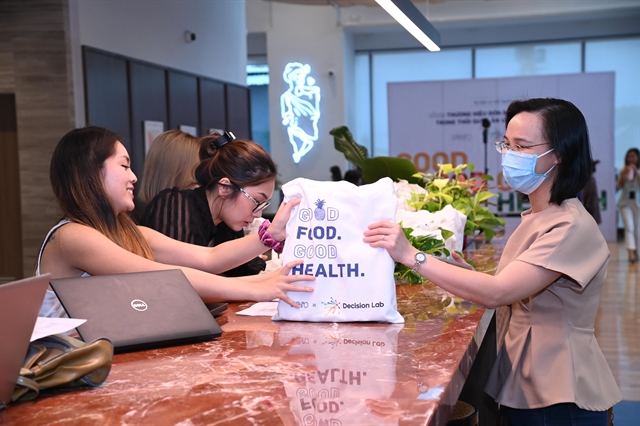 Economy
Economy

 |
Consumers, especially young people, prefer eating healthier after COVID-19 pandemic. -- Photo Courtesy Vero
HCM CITY — Clearly sharing the sources of raw materials is among the best ways for food and beverage brands to build more trust with customers as eating habits have significantly changed amid the COVID-19 pandemic, experts said.
"Given the general development trend of the food and beverage (F&B) industry, there are two key factors that receive a lot of attention: processing and ingredients. Business owners can share the source of raw materials that they use for a product. This is one of the ways brands can build more trust with customers," said Vũ Tiến Long, chief growth officer, Kamereo.
Việt Nam is among the fastest growing countries in Asia in terms of food expenditure. With GDP expected to start to grow sharply, the F&B industry will have a lot of room for growth.
However, there is also a lot of competition as more and more international brands are now starting to come to the country to research and launch their products.
Furthermore, eating habits have significantly changed after a long period of social distancing. Therefore, brands need to take wise steps to better serve the needs of their consumers, as well as maintain their positions in the market.
For many Vietnamese consumers, the nutritional value and health benefits of food and beverages are the most important factors when choosing a product.
A report entitled Helping Brands Tap into Việt Nam’s Changing Eating Habits, which was recently released by Vero and Decision Lab, found that more than 60 per cent of consumers choose healthy eating for better mental health.
Across Việt Nam, the report said, mental health is an issue and a trend that started even before the pandemic. Nearly 15 per cent of Việt Nam's population suffers from depression or anxiety disorders, with a growing number of cases in young people.
In 2021, Việt Nam was hit with one of the strictest lockdowns in the world. From June to September residents were told explicitly to stay at home. From 2020 to 2021, “loneliness” had one of the highest search term increases on Google, with “weight gain” as the concern that received the biggest search volume.
Stemming from the pandemic, consumers have understood that eating healthily also brings crucial benefits, in addition to keeping the body fit and healthy. Many studies have shown that food can help improve mood and wellness in general. This movement is on the rise, and has become a trend or buzz-topic among consumers.
About 64.3 per cent of Gen Z and 71.6 per cent of Gen Y responded that the main reason for them to choose eating healthier is because of the long-term health benefits. In addition, more than 60 per cent of consumers from both generations agree that mental health is also one of the great motivations for them to change their eating habits.
The pandemic has accelerated the use of vitamins, making them an important part of lifestyles and daily routines.
According to the report, more than 50 per cent of Vietnamese consumers search for information about healthy eating through social media.
Authority figures and experts are no longer the only trusted source for customers. Social media, friends and families, and influencers are increasingly becoming trusted authorities for consumers to seek out information about healthy eating.
“We’ve noticed that consumers are more open to trying new brands, stating sustainability, quality, or experience as the reason for this,” said strategic planner Vero, Phạm Hoài Anh. As the health and wellness movement grows in Việt Nam, consumers are gaining more knowledge about how to lead a healthier lifestyle.
There are many ways that brands can go further in producing products that support healthy lifestyles or adding more value to consumers' daily and casual meals. Helping consumers make better choices when it comes to what they eat, how they exercise, and how they cook will be key to developing strong authentic relationships. — VNS




